- Home
- H. Rider Haggard
The Ivory Child Page 15
The Ivory Child Read online
Page 15
Three hours later I halted the splendid white riding-camel upon whichI was mounted, and looked back from the crest of a wave of the desert.There far behind us on the horizon, by the help of my glasses, I couldmake out the site of the camp we had left and even the tall ant-hillwhence I had gazed in the moonlight at our mysterious escort whichseemed to have sprung from the desert as though by magic.
This was the manner of our march: A mile or so ahead of us went a picketof eight or ten men mounted on the swiftest beasts, doubtless to givewarning of any danger. Next, three or four hundred yards away, followeda body of about fifty Kendah, travelling in a double line, and behindthese the baggage men, mounted like everyone else, and leading behindthem strings of camels laden with water, provisions, tents of skinand all our goods, including the fifty rifles and the ammunition thatRagnall had brought from England. Then came we three white men and Hans,each of us riding as swift and fine a camel as Africa can breed. Onour right at a distance of about half a mile, and also on our left,travelled other bodies of the Kendah of the same numerical strengthas that ahead, while the rear was brought up by the remainder of thecompany who drove a number of spare camels.
Thus we journeyed in the centre of a square whence any escape would havebeen impossible, for I forgot to say that our keepers Harut and Marutrode exactly behind us, at such a distance that we could call to them ifwe wished.
At first I found this method of travelling very tiring, as does everyonewho is quite unaccustomed to camel-back. Indeed the swing and the joltof the swift creature beneath me seemed to wrench my bones asunder tosuch an extent that at the beginning I had once or twice to be liftedfrom the saddle when, after hours of torture, at length we camped forthe night. Poor Savage suffered even more than I did, for the motionreduced him to a kind of jelly. Ragnall, however, who I think had riddencamels before, felt little inconvenience, and the same may be said ofHans, who rode in all sorts of positions, sometimes sideways likea lady, and at others kneeling on the saddle like a monkey on abarrel-organ. Also, being very light and tough as rimpis, the swayingmotion did not seem to affect him.
By degrees all these troubles left us to such an extent that I couldcover my fifty miles a day, more or less, without even feeling tired.Indeed I grew to like the life in that pure and sparkling desert air,perhaps because it was so restful. Day after day we journeyed on acrossthe endless, sandy plain, watching the sun rise, watching it grow high,watching it sink again. Night after night we ate our simple food withappetite and slept beneath the glittering stars till the new dawn brokein glory from the bosom of the immeasurable East.
We spoke but little during all this time. It was as though the silenceof the wilderness had got hold of us and sealed our lips. Or perhapseach of us was occupied with his own thoughts. At any rate I know thatfor my part I seemed to live in a kind of dreamland, thinking of thepast, reflecting much upon the innumerable problems of this passing showcalled life, but not paying much heed to the future. What did the futurematter to me, who did not know whether I should have a share of it evenfor another month, or week, or day, surrounded as I was by the shadow ofdeath? No, I troubled little as to any earthly future, although I admitthat in this oasis of calm I reflected upon that state where past,present and future will all be one; also that those reflections, whichwere in their essence a kind of unshaped prayer, brought much calm to myspirit.
With the regiment of escort we had practically no communication; I thinkthat they had been forbidden to talk to us. They were a very silent setof men, finely-made, capable persons, of an Arab type, light rather thandark in colour, who seemed for the most part to communicate with eachother by signs or in low-muttered words. Evidently they looked uponHarut and Marut with great veneration, for any order which either ofthese brethren gave, if they were brethren, was obeyed withoutdispute or delay. Thus, when I happened to mention that I had lost apocket-knife at one of our camping-places two days' journey back, threeof them, much against my wish, were ordered to return to look for it,and did so, making no question. Eight days later they rejoined us muchexhausted and having lost a camel, but with the knife, which they handedto me with a low bow; and I confess that I felt ashamed to take thething.
Nor did we exchange many further confidences with Harut and Marut. Upto the time of our arrival at the boundaries of the Kendah country, ouronly talk with them was of the incidents of travel, of where we shouldcamp, of how far it might be to the next water, for water-holes or oldwells existed in this desert, of such birds as we saw, and so forth. Asto other and more important matters a kind of truce seemed to prevail.Still, I observed that they were always studying us, and especially LordRagnall, who rode on day after day, self-absorbed and staring straightin front of him as though he looked at something we could not see.
Thus we covered hundreds of miles, not less than five hundred at theleast, reckoning our progress at only thirty miles a day, includingstoppages. For occasionally we stopped at the water-holes or smalloases, where the camels drank and rested. Indeed, these were soconveniently arranged that I came to the conclusion that once there musthave been some established route running across these wastelands tothe south, of which the traditional knowledge remained with the Kendahpeople. If so, it had not been used for generations, for save those ofone or two that had died on the outward march, we saw no skeletons ofcamels or other beasts, or indeed any sign of man. The place was anabsolute wilderness where nothing lived except a few small mammals atthe oases and the birds that passed over it in the air on their way tomore fertile regions. Of these, by the way, I saw many that are knownboth to Europe and Africa, especially ducks and cranes; also storksthat, for aught I can say, may have come from far-off, homely Holland.
At last the character of the country began to change. Grass appeared onits lower-lying stretches, then bushes, then occasional trees and amongthe trees a few buck. Halting the caravan I crept out and shot two ofthese buck with a right and left, a feat that caused our grave escort tostare in a fashion which showed me that they had never seen anything ofthe sort done before.
That night, while we were eating the venison with relish, since it wasthe first fresh meat that we had tasted for many a day, I observed thatthe disposition of our camp was different from its common form. Thus itwas smaller and placed on an eminence. Also the camels were not allowedto graze where they would as usual, but were kept within a limited areawhile their riders were arranged in groups outside of them. Further, thestores were piled near our tents, in the centre, with guards set overthem. I asked Harut and Marut, who were sharing our meal, the reason ofthese alterations.
"It is because we are on the borders of the Kendah country," answeredold Harut. "Four days' more march will bring us there, Macumazana."
"Then why should you take precautions against your own people? Surelythey will welcome you."
"With spears perhaps. Macumazana, learn that the Kendah are not one buttwo people. As you may have heard before, we are the White Kendah, butthere are also Black Kendah who outnumber us many times over, though inthe beginning we from the north conquered them, or so says our history.The White Kendah have their own territory; but as there is no otherroad, to reach it we must pass through that of the Black Kendah, whereit is always possible that we may be attacked, especially as we bringstrangers into the land."
"How is it then that the Black Kendah allow you to live at all, Harut,if they are so much the more numerous?"
"Because of fear, Macumazana. They fear our wisdom and the decrees ofthe Heavenly Child spoken through the mouth of its oracle, which, if itis offended, can bring a curse upon them. Still, if they find us outsideour borders they may kill us, if they can, as we may kill them if wefind them within our borders."
"Indeed, Harut. Then it looks to me as though there were a war breedingbetween you."
"A war is breeding, Macumazana, the last great war in which either theWhite Kendah or the Black Kendah must perish. Or perhaps both will dietogether. Maybe that is the real reason why we have asked you to be ourg
uest, Macumazana," and with their usual courteous bows, both of themrose and departed before I could reply.
"You see how it stands," I said to Ragnall. "We have been brought hereto fight for our friends, Harut, Marut and Co., against their rebellioussubjects, or rather the king who reigns jointly with them."
"It looks like it," he replied quietly, "but doubtless we shall findout the truth in time and meanwhile speculation is no good. Do you go tobed, Quatermain, I will watch till midnight and then wake you."
That night passed in safety. Next day we marched before the dawn,passing through country that grew continually better watered and morefertile, though it was still open plain but sloping upwards ever moresteeply. On this plain I saw herds of antelopes and what in the distancelooked like cattle, but no human being. Before evening we camped wherethere was good water and plenty of food for the camels.
While the camp was being set Harut came and invited us to follow him tothe outposts, whence he said we should see a view. We walked with him, amatter of not more than a quarter of a mile to the head of that rise upwhich we had been travelling all day, and thence perceived one ofthe most glorious prospects on which my eyes have fallen in all greatAfrica. From where we stood the land sloped steeply for a matter of tenor fifteen miles, till finally the fall ended in a vast plain like tothe bottom of a gigantic saucer, that I presume in some far time of theworld's history was once an enormous lake. A river ran east and westacross this plain and into it fell tributaries. Far beyond this riverthe contours of the country rose again till, many, many miles away,there appeared a solitary hill, tumulus-shaped, which seemed to becovered with bush.
Beyond and surrounding this hill was more plain which with the aid of mypowerful glasses was, we could see, bordered at last by a range ofgreat mountains, looking like a blue line pencilled across the northerndistance. To the east and west the plain seemed to be illimitable.Obviously its soil was of a most fertile character and supported numbersof inhabitants, for everywhere we could see their kraals or villages.Much of it to the west, however, was covered with dense forest with, toall appearance, a clearing in its midst.
"Behold the land of the Kendah," said Harut. "On this side of the RiverTava live the Black Kendah, on the farther side, the White Kendah."
"And what is that hill?"
"That is the Holy Mount, the Home of the Heavenly Child, where no manmay set foot"--here he looked at us meaningly--"save the priests of theChild."
"What happens to him if he does?" I asked.
"He dies, my Lord Macumazana."
"Then it is guarded, Harut?"
"It is guarded, not with mortal weapons, Macumazana, but by the spiritsthat watch over the Child."
As he would say no more on this interesting matter, I asked him as tothe numbers of the Kendah people, to which he replied that the BlackKendah might number twenty thousand men of arm-bearing age, but theWhite Kendah not more than two thousand.
"Then no wonder you want spirits to guard your Heavenly Child," Iremarked, "since the Black Kendah are your foes and with you warriorsare few."
At this moment our conversation was interrupted by the arrival of apicket on a camel, who reported something to Harut which appeared todisturb him. I asked him what was the matter.
"That is the matter," he said, pointing to a man mounted on a rough ponywho just then appeared from behind some bushes about half a mile away,galloping down the slope towards the plain. "He is one of the scouts ofSimba, King of the Black Kendah, and he goes to Simba's town in yonderforest to make report of our arrival. Return to camp, Macumazana, andeat, for we must march with the rising of the moon."
As soon as the moon rose we marched accordingly, although the camels,many of which were much worn with the long journey, scarcely had beengiven time to fill themselves and none to rest. All night we marcheddown the long slope, only halting for half an hour before daylight toeat something and rearrange the loads on the baggage beasts, which now,I noticed, were guarded with extra care. When we were starting againMarut came to us and remarked with his usual smile, on behalf of hisbrother Harut, who was otherwise engaged, that it might be well if wehad our guns ready, since we were entering the land of the elephant Janaand "who knew but that we might meet him?"
"Or his worshippers on two legs," I suggested, to which his only replywas a nod.
So we got our repeating rifles, some of the first that were ever made,serviceable but rather complicated weapons that fired five cartridges.Hans, however, with my permission, armed himself with the little Purdeypiece that was named "Intombi," the singe-barrelled, muzzle-loading gunwhich had done me so much service in earlier days, and even on my lastjourney to Pongoland. He said that he was accustomed to it and did notunderstand these new-fangled breechloaders, also that it was "lucky." Iconsented as I did not think that it made much difference with what kindof rifle Hans was provided. As a marksman he had this peculiarity: up toa hundred yards or so he was an excellent shot, but beyond that distanceno good at all.
A quarter of an hour later, as the dawn was breaking, we passed througha kind of _nek_ of rough stones bordering the flat land, and emergedinto a compact body on to the edge of the grassy plain. Here the wordwas given to halt for a reason that became clear to me so soon as I wasout of the rocks. For there, marching rapidly, not half a mile away,were some five hundred white-robed men. A large proportion of thesewere mounted, the best being foot-soldiers, of whom more were runningup every minute, appearing out of bush that grew upon the hill-side,apparently to dispute our passage. These people, who were black-facedwith fuzzy hair upon which they wore no head-dress, all seemed to bearmed with spears.
Presently from out of the mass of them two horsemen dashed forward, oneof whom bore a white flag in token that they came to parley. Our advanceguard allowed them to pass and they galloped on, dodging in and outbetween the camels with wonderful skill till at length they came towhere we were with Harut and Marut, and pulling up their horses sosharply that the animals almost sat down on their haunches, saluted byraising their spears. They were very fine-looking fellows, perfectlyblack in colour with a negroid cast of countenance and long frizzledhair which hung down on to their shoulders. Their clothing was light,consisting of hide riding breeches that resembled bathing drawers,sandals, and an arrangement of triple chains which seemed to be madeof some silvery metal that hung from their necks across the breast andback. Their arms consisted of a long lance similar to that carried bythe White Kendah, and a straight, cross-handled sword suspended froma belt. This, as I ascertained afterwards, was the regulation cavalryequipment among these people. The footmen carried a shorter spear, around leather shield, two throwing javelins or assegais, and a curvedknife with a horn handle.
"Greeting, Prophets of the Child!" cried one of them. "We are messengersfrom the god Jana who speaks through the mouth of Simba the King."
"Say on, worshippers of the devil Jana. What word has Simba the King forus?" answered Harut.
"The word of war, Prophet. What do you beyond your southern boundary ofthe Tava river in the territory of the Black Kendah, that was sealedto them by pact after the battle of a hundred years ago? Is not allthe land to the north as far as the mountains and beyond the mountainsenough for you? Simba the King let you go out, hoping that the desertwould swallow you, but return you shall not."
"That we shall know presently," replied Harut in a suave voice. "Itdepends upon whether the Heavenly Child or the devil Jana is the morepowerful in the land. Still, as we would avoid bloodshed if we may, wedesire to explain to you, messengers of King Simba, that we are hereupon a peaceful errand. It was necessary that we should convey the whitelords to make an offering to the Child, and this was the only road bywhich we could lead them to the Holy Mount, since they come from thesouth. Through the forests and the swamps that lie to the east and westcamels cannot travel."
"And what is the offering that the white men would make to the Child,Prophet? Oh! we know well, for like you we have our magic. The offeringthat they must m
ake is the blood of Jana our god, which you have broughtthem here to kill with their strange weapons, as though any weapon couldprevail against Jana the god. Now, give to us these white men that wemay offer them to the god, and perchance Simba the King will let you gothrough."
"Why?" asked Harut, "seeing that you declare that the white men cannotharm Jana, to whom indeed they wish no harm. To surrender them to youthat they may be torn to pieces by the devil Jana would be to break thelaw of hospitality, for they are our guests. Now return to Simba theKing, and say to Simba that if he lifts a spear against us the threefoldcurse of the Child shall fall upon him and upon you his people: Thecurse of Heaven by storm or by drought. The curse of famine. The curseof war. I the prophet have spoken. Depart."
Watching, I could see that this ultimatum delivered by Harut in a mostimpressive voice, and seconded as it was by the sudden and simultaneouslifting of the spears of all our escort that were within hearing,produced a considerable effect upon the messengers. Their faces grewafraid and they shrank a little. Evidently the "threefold curse of theChild" suggested calamities which they dreaded. Making no answer, theywheeled their horses about and galloped back to the force that wasgathering below as swiftly as they had come.
"We must fight, my Lord Macumazana," said Harut, "and if we would live,conquer, as I know that we shall do."
Then he issued some orders, of which the result was that the caravanadopted a wedge-shaped formation like to that of a great flock ofwildfowl on the wing. Harut stationed himself almost at the apex of thetriangle. I with Hans and Marut were about the centre of the line, whileRagnall and Savage were placed opposite to us in the right line, thewhole width of the wedge being between us. The baggage camels and theirleaders occupied the middle space between the lines and were followed bya small rear-guard.
At first we white men were inclined to protest at this separation, butwhen Marut explained to us that its object was to give confidence to thetwo divisions of the force and also to minimize the risk of destructionor capture of all three of us, of course we had nothing more to say.So we just shook hands, and with as much assurance as we could commandwished each other well through the job.
Then we parted, poor Savage looking very limp indeed, for this was hisfirst experience of war. Ragnall, however, who came of an old fightingstock, seemed to be happy as a king. I who had known so many battles,was the reverse of happy, for inconveniently enough there flashed intomy mind at this juncture the dying words of the Zulu captain and seer,Mavovo, which foretold that I too should fall far away in war; and Iwondered whether this were the occasion that had been present to hisforeseeing mind.
Only Hans seemed quite unconcerned. Indeed I noted that he took theopportunity of the halt to fill and light his large corn-cob pipe, a bitof bravado in the face of Providence for which I could have kicked himhad he not been perched in his usual monkey fashion on the top of a verytall camel. The act, however, excited the admiration of the Kendah, forI heard one of them call to the others:
"Look! He is not a monkey after all, but a man--more of a man than hismaster."
The arrangements were soon made. Within a quarter of an hour of thedeparture of the messengers Harut, after bowing thrice towards the HolyMountain, rose in his stirrups and shaking a long spear above his head,shouted a single word:
"Charge!"

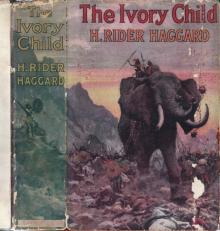 The Ivory Child
The Ivory Child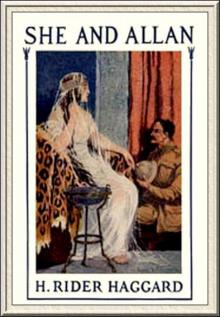 She and Allan
She and Allan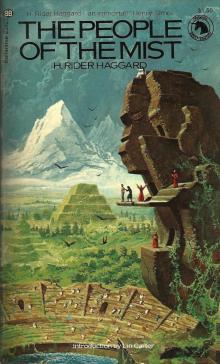 The People of the Mist
The People of the Mist She
She Morning Star
Morning Star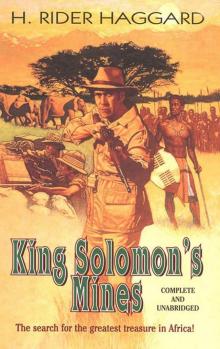 King Solomon's Mines
King Solomon's Mines She: A History of Adventure
She: A History of Adventure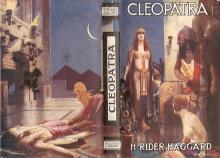 Cleopatra
Cleopatra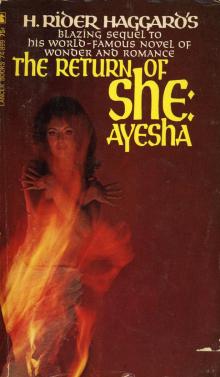 Ayesha, the Return of She
Ayesha, the Return of She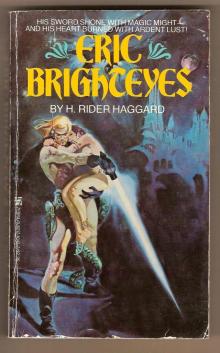 Eric Brighteyes
Eric Brighteyes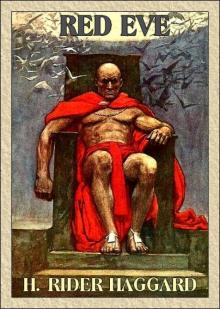 Red Eve
Red Eve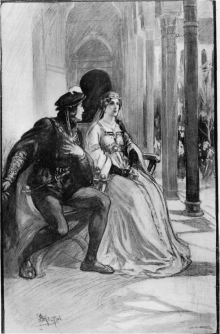 Fair Margaret
Fair Margaret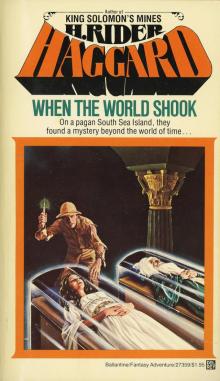 When the World Shook
When the World Shook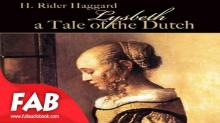 Lysbeth, a Tale of the Dutch
Lysbeth, a Tale of the Dutch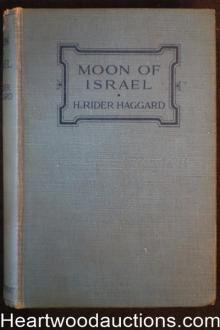 Moon of Israel: A Tale of the Exodus
Moon of Israel: A Tale of the Exodus Long Odds
Long Odds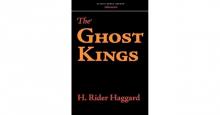 The Ghost Kings
The Ghost Kings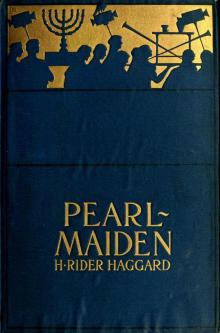 Pearl-Maiden: A Tale of the Fall of Jerusalem
Pearl-Maiden: A Tale of the Fall of Jerusalem Allan and the Holy Flower
Allan and the Holy Flower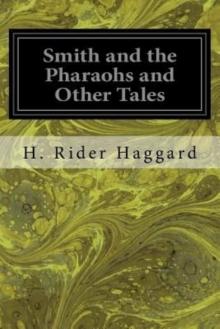 Smith and the Pharaohs, and other Tales
Smith and the Pharaohs, and other Tales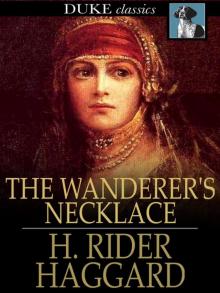 The Wanderer's Necklace
The Wanderer's Necklace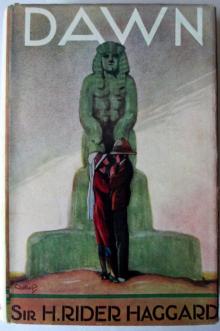 Dawn
Dawn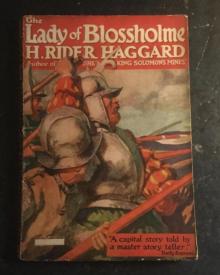 The Lady of Blossholme
The Lady of Blossholme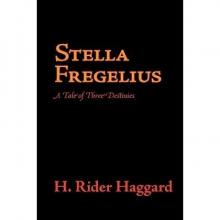 Stella Fregelius: A Tale of Three Destinies
Stella Fregelius: A Tale of Three Destinies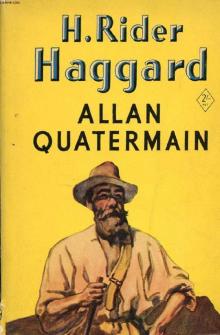 Allan Quatermain
Allan Quatermain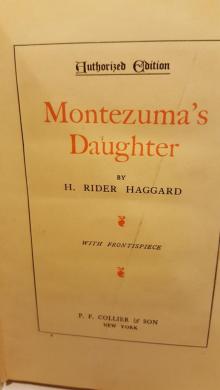 Montezuma's Daughter
Montezuma's Daughter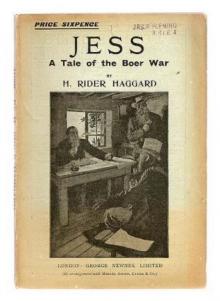 Jess
Jess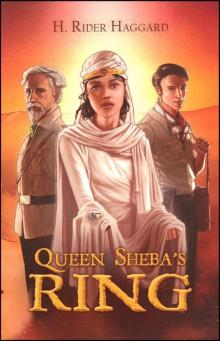 The Brethren
The Brethren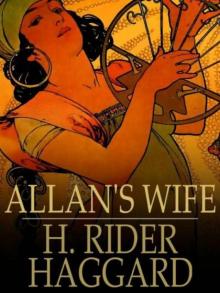 Allan's Wife
Allan's Wife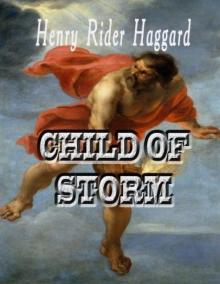 Child of Storm
Child of Storm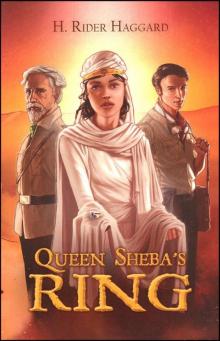 Queen Sheba's Ring
Queen Sheba's Ring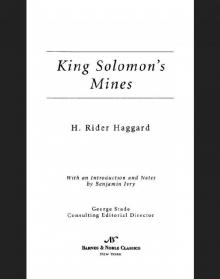 King Solomon's Mines (Barnes & Noble Classics Series)
King Solomon's Mines (Barnes & Noble Classics Series)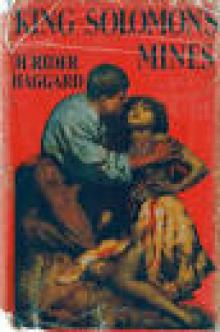 Complete Allan Quatermain Omnibus - Volumes 1 - 10
Complete Allan Quatermain Omnibus - Volumes 1 - 10